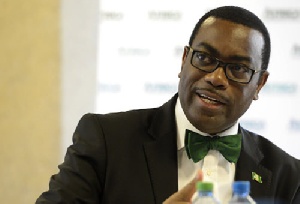Dr Akinwumi Adesina, President of the African Development Bank (AfDB) has called for bold action to light up Africa within the next 10 years.
“Ten years is the timeframe. We need to take Africa out of the darkness. Period,” he told a panel discussion in New York, recently on “How Energy Can Spark Global Prosperity.”
It was at the instance of the Global Initiative Annual Meeting, which was made available to the Ghana News Agency.
Dr Adesina shared the stage with Nancy Pfund, Founder and Managing Partner of DBL Partners, a venture capital firm; and Wanjira Mathai, Director, Partnerships for Women's Entrepreneurship in Renewables, at the Wangari Maathai Institute, with audience including policymakers, entrepreneurs and investors as well as members of civil society participating.
He highlighted the urgency to bring energy to the millions of people who do not have access to it.
The problem of access to energy is well documented. Of the 1.3 billion people who do not have access to electricity in the world, more than 600 million live on the African continent.
“Africa is just tired of being in the dark,” Adesina told the audience.
She said: “Lack of energy is one of the major impediments to economic growth, which in turns make it difficult for young people to get the jobs they need. In addition, it can be a source of serious public health problems.
It is estimated that around 600,000 Africans, mostly women, die each year as a result of household air pollution.
“It does not make sense for a woman to die just to cook a decent meal,” Adesina said.
The AfDB launched a New Deal on Energy for Africa, which outlines the solutions to Africa’s energy problems in a rapidly changing technological and economic landscape.
The Bank would invest $ 12 billion in different energy projects for the next five years, and would leverage about $ 50 billion from the private sector.
Business News of Monday, 26 September 2016
Source: GNA













